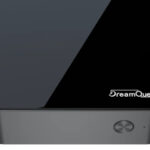DreamQuest Mini PC – Review
Without wanting to keep everyone in suspense, at first sight it seems pretty incredible. I had the chance to spend a day or so playing around with one and it’s a pretty slick little machine. Mine came with Windows 11 pre-installed, so the first thing I did was to install Ubuntu 25.04 from a Universal Bootloader USB key. A relatively straightforward process with no surprises. As far as I can see, all hardware in the machine is supported ‘out of the box’ and there was nothing to do in terms of drivers. Here’s what it comes with;

- Intel N150 Processor, feels like it’s on a par with (or better) a Raspberry Pi 5
- 16Gb RAM
- 512Gb M.2 SSD
- 2 x 1Gb Ethernet
- 4 x USB 3.x
- SD Card slot (Mini?)
- WiFi & Bluetooth
- Multiple display choices, HDMI, Displayport and Type-C
I only tried the HDMI output, although apparently (!) you can use multiple connectors at the same time to run multiple 4k screens in parallel (not sure whether this implies two or three). It was tested with Ubuntu 25.04 and general performance is pretty good. Seemed quite happy playing full HD video, full-screen on a 4k screen.
I didn’t get around to measuring the power, but the documentation and other reviews I’ve seen say it works in the 6W (idle) to 25W bracket, which is pretty good compared standard desktop machines. Although slightly more than a Raspberry Pi which typically operates in the 5W to 12W range.
Summary
Makes a really good and cost effective desktop workstation. From a server perspective, while still very capable it’s a little limited in terms of IO throughput by the M.2 being SSD rather than NVME. I was only getting ~ 430Mb/sec on sustained read transfers whereas M.2 on a Raspberry Pi can clock around 900. Having said that it depends on your server priorities, with two 1Gb network interfaces and 16Gb of RAM it currently works out cheaper than the equivalent Raspberry Pi by some margin.
Notes
- There are a number of models with different Pro’s and Con’s, I’ve only tried the one mentioned
- At the time of purchase the Windows 11 version seemed to be cheaper than the Linux version
- The BIOS seems not to have a Legacy, option so you’ll need a UEFI compatible USB key
- The SSD brand seemed to be a company called “KingFast”, which isn’t one I’m familiar with
- Please note this review is not a specific endorsement, just an observation / opinion
- There’s a link to their UK Website here, or alternatively you can find them on Amazon.




